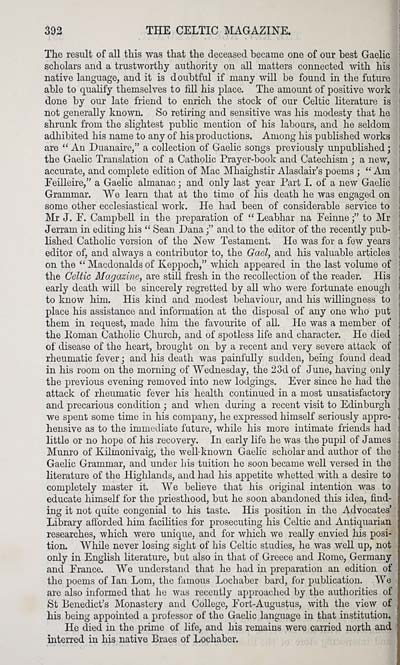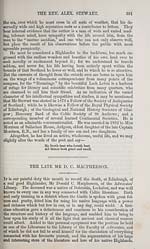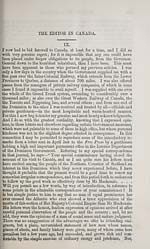Blair Collection > Celtic magazine > Volume 5
(392)
Download files
Complete book:
Individual page:
Thumbnail gallery: Grid view | List view

392 THE CELTIC MAGAZINE.
The result of all this was that the deceased became one of our best Gaelic
scholars and a trustworthy authority on all matters connected with his
native language, and it is doubtful if many will be found in the future
able to qualify themselves to fill his place. The amount of positive work
done by our late friend to enrich the stock of our Celtic literature is
not generally known. So retiring and sensitive was his modesty that he
shrunk from the slightest public mention of his labours, and he seldom
adhibited his name to any of his productions. Among his published works
are " An Duanaire," a collection of Gaelic songs previously unpublished ; I
the Gaelic Translation of a Catholic Prayer-book and Catechism ; a new, |
accurate, and complete edition of Mac Mhaighstir Alasdair's poems ; " Am |
Feilleu'e," a Gaelic almanac ; and only last year Part I. of a new Gaelic j
Grammar. "We learn that at the time of his death he was engaged on i
some other ecclesiastical work. He had been of considerable service to i
Mr J, F. Campbell in the preparation of " Leabhar na Peinne /' to Mr |
Jerram in editing his " Sean Dana ;" and to the editor of the recently pub- \
lished Catholic version of the New Testament. He was for a few years ;
editor of, and always a contributor to, the Gael, and his valuable articles |
on the " Macdonalds of Keppoch," which appeared in the last volume of |
the Celtic Magazine, are still fresh in the recollection of the reader. His i
early death will be sincerely regretted by all who were fortunate enough i
to know him. His kind and modest behaviour, and his willingness to |
place his assistance and information at the disposal of any one who put ;
them in request, made him the favourite of all. He was a member of ;
the Eoman Catholic Church, and of spotless life and character. He died ;
of disease of the heart, brought on by a recent and very severe attack of !
rheumatic fever ; and his death was painfully sudden, being found dead
in his room on the morning of "Wednesday, the 23d of June, having only
the previous evening removed into now lodgings. Ever since he had the
attack of rheumatic fever his health contiuued in a most unsatisfactory
and precarious condition ; and when during a recent visit to Edinburgh |
we spent some time in his company, he expressed himself seriously appre- |
hensive as to the immediate future, while his more intimate friends had i
little or no hope of his recovery. In early life he was the jjupil of James :
Munro of Kihnonivaig, the well-known Gaelic scholar and author of the i
Gaelic Grammar, and under his tuition he soon became well versed in the |
literature of the Higlilands, and had his appetite whetted with a desire to \
completely master it. We beheve that his original intention was to
educate himself for the priesthood, but he soon abandoned this idea, find- {!
ing it not quite congenial to his taste. His position in the Advocates'
Library aftbrded him facilities for prosecuting his Celtic and Antiquarian
researches, which were unique, and for which we really envied his posi-
tion. "While never losing sight of his Celtic studies, he was well up, not i
only in English literature, but also in that of Greece and Pome, Germany
and Prance. "We understand that he had in preparation an edition of
the poems of Ian Lorn, the famous Lochaber bard, for publication. We
are also informed that he was recently approached by the authorities of
St Benedict's Monastery and CoUege, Port-Augustus, with the view of
his being appointed a professor of the Gaelic language in that institution.
He died in the prime of life, and his remains were carried north and
interred in his native Braes of Lochaber.
The result of all this was that the deceased became one of our best Gaelic
scholars and a trustworthy authority on all matters connected with his
native language, and it is doubtful if many will be found in the future
able to qualify themselves to fill his place. The amount of positive work
done by our late friend to enrich the stock of our Celtic literature is
not generally known. So retiring and sensitive was his modesty that he
shrunk from the slightest public mention of his labours, and he seldom
adhibited his name to any of his productions. Among his published works
are " An Duanaire," a collection of Gaelic songs previously unpublished ; I
the Gaelic Translation of a Catholic Prayer-book and Catechism ; a new, |
accurate, and complete edition of Mac Mhaighstir Alasdair's poems ; " Am |
Feilleu'e," a Gaelic almanac ; and only last year Part I. of a new Gaelic j
Grammar. "We learn that at the time of his death he was engaged on i
some other ecclesiastical work. He had been of considerable service to i
Mr J, F. Campbell in the preparation of " Leabhar na Peinne /' to Mr |
Jerram in editing his " Sean Dana ;" and to the editor of the recently pub- \
lished Catholic version of the New Testament. He was for a few years ;
editor of, and always a contributor to, the Gael, and his valuable articles |
on the " Macdonalds of Keppoch," which appeared in the last volume of |
the Celtic Magazine, are still fresh in the recollection of the reader. His i
early death will be sincerely regretted by all who were fortunate enough i
to know him. His kind and modest behaviour, and his willingness to |
place his assistance and information at the disposal of any one who put ;
them in request, made him the favourite of all. He was a member of ;
the Eoman Catholic Church, and of spotless life and character. He died ;
of disease of the heart, brought on by a recent and very severe attack of !
rheumatic fever ; and his death was painfully sudden, being found dead
in his room on the morning of "Wednesday, the 23d of June, having only
the previous evening removed into now lodgings. Ever since he had the
attack of rheumatic fever his health contiuued in a most unsatisfactory
and precarious condition ; and when during a recent visit to Edinburgh |
we spent some time in his company, he expressed himself seriously appre- |
hensive as to the immediate future, while his more intimate friends had i
little or no hope of his recovery. In early life he was the jjupil of James :
Munro of Kihnonivaig, the well-known Gaelic scholar and author of the i
Gaelic Grammar, and under his tuition he soon became well versed in the |
literature of the Higlilands, and had his appetite whetted with a desire to \
completely master it. We beheve that his original intention was to
educate himself for the priesthood, but he soon abandoned this idea, find- {!
ing it not quite congenial to his taste. His position in the Advocates'
Library aftbrded him facilities for prosecuting his Celtic and Antiquarian
researches, which were unique, and for which we really envied his posi-
tion. "While never losing sight of his Celtic studies, he was well up, not i
only in English literature, but also in that of Greece and Pome, Germany
and Prance. "We understand that he had in preparation an edition of
the poems of Ian Lorn, the famous Lochaber bard, for publication. We
are also informed that he was recently approached by the authorities of
St Benedict's Monastery and CoUege, Port-Augustus, with the view of
his being appointed a professor of the Gaelic language in that institution.
He died in the prime of life, and his remains were carried north and
interred in his native Braes of Lochaber.
Set display mode to: Large image | Transcription
Images and transcriptions on this page, including medium image downloads, may be used under the Creative Commons Attribution 4.0 International Licence unless otherwise stated. ![]()
| Early Gaelic Book Collections > Blair Collection > Celtic magazine > Volume 5 > (392) |
|---|
| Permanent URL | https://digital.nls.uk/76453364 |
|---|
| Description | Volume V, 1880. |
|---|---|
| Shelfmark | Blair.6 |
| Attribution and copyright: |
|
| Description | A selection of books from a collection of more than 500 titles, mostly on religious and literary topics. Also includes some material dealing with other Celtic languages and societies. Collection created towards the end of the 19th century by Lady Evelyn Stewart Murray. |
|---|
| Description | Selected items from five 'Special and Named Printed Collections'. Includes books in Gaelic and other Celtic languages, works about the Gaels, their languages, literature, culture and history. |
|---|

